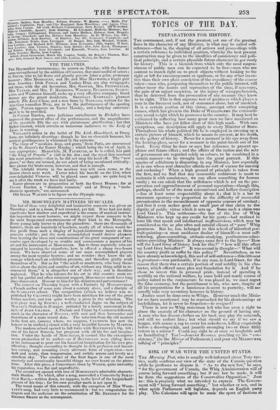RISK OF WAR WITH THE UNITED STATES.
THE Morning Post, who is usually well-informed about Tory tac- tics, really confirms our view of the state of the Canada question while he professes to dispute it. " As to the new law," he says, " for the government of Canada, the Whig Administration will of course bring forward something; but if any law be made. it will be from the suggestions of the Conservative Opposition." Just so : this is precisely what we intended to express. The Govern- ment will " bring forward something ;" but whether or not, and in what spirit Parliament will legislate, depends on English party play. The Colonists will again be made the sport of factions at home. And the most probable result, as we said last week, is a war with the United States.
The news which has since arrived from New Brunswick and Maine, helps the iihrning Post in confirming our view of the sub- ject. In this case, the first aggression was from the British side, and the public arsenal was robbed by British subjects. But it matters not from which sidd provocation to war shall come. Along the whole Canadian frontier, the utterly disorganized state of our colonies invites American aggression ; and their warlike state sug- gests British aggression on the Americans, in order to maintain a great expenditure by England on Colonial Militia and Volunteers. It is scarcely possible to imagine a state of things more likely to end in war.
Has any English statesman asked himself what effects a war with America would have on the economical and political condi- tion of this country ? The expense of such a war is the least evil to be apprehended. Considering the vast amount of English capital which emigrates every year in search of higher profits than the Corn-law allows in this country, it would be easy to raise by loan the requisite fluids for conducting a war with the United States ; and there can be no doubt that a war with England would be very injurious to the AMericans. But what would become of Manchester ? The name of that town stands for the whole cotton- manufacture of England and Scotland. Suppose this, not destroyed for ever, but stopped for a year or two. How many people would be thrown out of employment ? But these would .not be all; for while the whole cotton-manufacture was stopped for want of its raw material, our manufactures of woollen and hard-ware would be greatly affected by the loss of their American market. Leeds, Sheffield, and Birmingham would suffer, not in the same degree perhaps as the towns of Lancashire, but to an extent of which there has been no previous example. The past, indeed, affords but little information whereby to judge of the present as respects our sus- ceptibility of injury from war. We speak not of war with such countries as France or Russia, with which England has but small commercial relations, but of a great civil war between England and America. Civil war it might well be termed, and for three dis- tinct reasons,—first, as occurring between kindred nations ; se- condly, nations which, though separated politically by the folly of the Government of one of them, have been so reunited economi- cally by the most intimate commercial ties, that they cannot go to war without the deepest mutual injury; and lastly, (which is the main consideration for those who rule here,) because an American war, by throwing out of employment great masses of our popula- tion, who are already in a state of savage political discontent, and organized for mischief, would most likely produce civil war in Eng- land. And such a war as that would be ! The Tories are so far right in calling for an increase of the Army, that this Government is really without the means of repressing an insurrection ; and it is well the public should be made aware of another fact, which is, that for some reason or other not yet ascertained, the Government has great difficulty in obtaining recruits. War with America, then, in the present economical and political state of this country, is another word for revolution.
There can be no doubt that the bulk of the American people are as much indisposed as the people of England to a war between the kindred and mutually-dependent nations. It is the state of our Colonies, alone, which renders war probable : and this is a matter absolutely within the control of government. We mean, govern- ment in the large sense of legislation as well as administration. A wise and vigorous operation of the British Government would place our North American Colonies in such a position that all subjects of probable dispute between England and the United States might be speedily removed. But what chance is there, in the present state of parties, of wise and vigorous action by the Legislature and Executive of this country ? Government, speaking again in the larger sense, is paralyzed, partly b' the war of factions, which necessarily occupies a Legislature m which hostile parties are nearly equal, and partly by the feebleness and cowardice of an Executive which is dependent for its existence on the pleasure of its opponents. The Whigs, as the Morning Post says, will "of course bring forward something ;" but of a wisely-planned and vigorously-executed law for the settlement of Canadian affairs without reference to party objects here, there can be no prospect
while the state of parties here makes so ignorant and careless a person as Lord MELDOVRNE the apt head of a do-nothing Go- vernment.



























 Previous page
Previous page